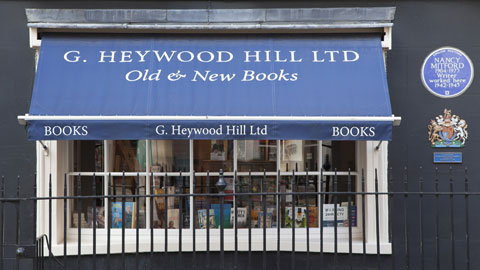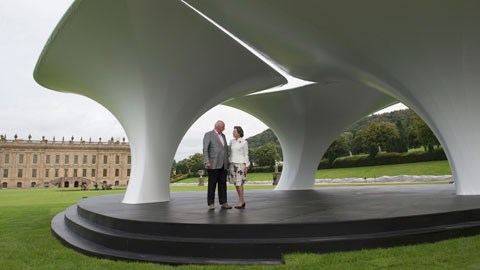The Duke of Devonshire talks to Brunswick Arts about the economics of his family’s bookshop, Heywood Hill
Peregrine Cavendish, 12th and current Duke of Devonshire, operates a small, old-fashioned bookshop in Mayfair, a historic, neighborhood of London bordered by Hyde Park near Buckingham Palace. In the age of Amazon, Kindle and Apple iTunes, the economic model for garden-variety independent bookstores has evaporated. But Heywood Hill not only survives but thrives, through a combination of innovation and devotion by the Duke and his son-in-law, Heywood Chairman Nicky Dunn.
The Duke recently spoke with Brunswick Arts about the promise of the book business, as well as its challenges, and the growing global customer base for the shop’s specialized subscriptions and libraries.
The Cavendish family has a historic love affair with books. Andrew Cavendish, later the 11th Duke of Devonshire, was a regular customer at the bookshop founded in 1936 by Heywood Hill. Not only did he become a majority shareholder, he also married author Deborah Mitford, the sister of author Nancy Mitford, who worked in the shop.
The central family estate, Chatsworth, has served 16 generations and is home to a magnificent library of its own, with books dating back to the 16th century, including a first edition of a work by Thomas Hobbes – a resident of the house and tutor of the second Duke – and a prayer book with an inscription by King Henry VII to his daughter Margaret Tudor, Queen of Scots.
Let’s start with your family’s literary connection.
That’s a good place to start. I’m the only person of my immediate family who hasn’t actually written a book. My sister, Emma, has written the authoritative book on rag rugs. And Sophie, my other sister, wrote a couple of books. My mother is better known as an author, and she wrote quite a lot of books. My father wrote a wonderful book about a racehorse called Park Top, and a book of memoirs as well. So, they’re all writers. I tried and failed. It was too difficult, I thought.
Are you a collector of books yourself?
I don’t collect books as such; I do buy quite a lot of books, partly because of Heywood Hill and partly because I always hope that I’m going to read them and quite often don’t. [Laughs] I hardly ever buy old books. I don’t buy sort of library-quality books.
My taste has changed. When I was much younger, I’d read an awful lot of novels. I prefer contemporary, mostly non-fiction now. I read a lot of my family history and things to do with Chatsworth or the collections or painters or artists or whatever. If ever there’s a new monograph about a private house in England, I have to buy it. There are about 40 altogether in the library as sort of reference books.


